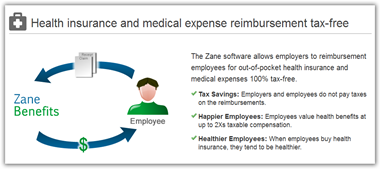It lets the small business design what they feel they need which can be both good and bad as the price may come down but some items may be overlooked. Businesses with less than 50 employees are not required to provide health insurance benefits so this is the target market here. I get people telling me all the time “they don’t have time to read” and yet if you want something today, selective reading has to be on the agenda.
They will educate you as well and the article here makes mention of their education services. BD
Today, Zane Benefits, Inc., a leader in Defined Contribution Health Plans and Private Health Exchanges, announced its new website, designed to educate employers, accountants, and health insurance professionals about the new federal regulations allowing simplified employer health benefits.
As group health insurance costs continue to rise, employers are looking for ways to
offer health benefits at a lower price. Zane Benefits’ online defined contribution health plan allows an employer to name its price. Rather than paying the costs to provide a specific group health plan (a "defined benefit"), employers instead fix their costs by establishing a monthly dollar amount (a “defined contribution”) that employees choose how to spend.
According to the website, the two primary benefits of Zane’s online program include:
1. No Minimum Contributions Requirements – This allows a small business to define a contribution it can afford.
2. No Minimum Participation Requirements – This allows a small business to set its own eligibility and/or participation requirements.

Using the Zane program, employers make available a tax-free monthly allowance that employees use to purchase their own individual policy directly from a carrier or independent licensed health insurance agent. Or, if an employer is not able to provide an allowance for certain employees, such employees may use a portion of their pre-tax salary to purchase a policy. This increases the employee’s after-tax purchasing power by 20 to 40 percent and also reduces the company’s payroll liabilities.
“Most people don’t realize that small employers with less than 50 employees are exempt from the employer mandates in the Health Care Reform bill,” Pilzer added. “Small employers today benefit from the increased availability of affordable individual policies regardless of what the U.S. Supreme Court eventually rules on the bill.”



You helped me put a missing piece of the puzzle into place. THANK YOU!
ReplyDelete